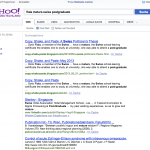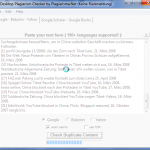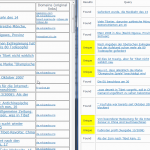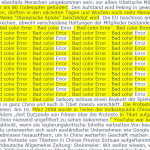Software Profile | Description | Pros & Cons | Report | Usability | Summary | Screenshots | Links
Software Profile
| ID | S13-17 |
| Product | Plagiarisma |
| Company | The web site states that Plagiarisma was written by Eugene Ekimov, but no company is mentioned or address given. |
| Web-Site | http://plagiarisma.net/ |
| Software-Type | Available online, for Android, and for Windows |
| Pricing | Available free of charge. A premium account is mentioned, but no further information given. |
| Testdate | 22 May 2013 |
Description
Plagiarisma is said to have been developed by Eugene Ekimov in 2010, but there is no company named and no contact information given. It splits up into an online-, Android- and desktop-Version. In each of these alternatives, a free and a premium version exists, although it is not clear how much the premium version costs and what one obtains for the price. The search is said to be based on five different search engines, which can be chosen by the user: Google, Yahoo, Babylon, Google Scholar or Google Books. Google Search is only enabled for registered users. In the 2012 test, only the desktop and the online version was tested. Plagiarisma also offers students a so-called „synonymizer“ that will replace words with synonyms in order to fool plagiarism detection systems.
Pros & Cons
The system states, that it can find plagiarism in 190 different languages. Files can be uploaded in all popular formats. In the current test, the system was able to find plagiarism in Hebrew language and also did find sources from Google Books. However, only five documents can be checked per IP address per day. This is probably due to the search engines that restrict the number of request per IP address. Plagiarisma suggests that customers misuse Tor, a system that supports anonymous browsing, in order to have multiple IP addresses from which to submit documents.
The results produced by Plagiarisma are not precise, often returning quite irrelevant sources. They system does not return a direct link to a source, but to the search engine results page for the sample of text used. A manual followup for all of the links that are reported is thus necessary, so one might as well do the searching without the software. Additionally, many error messages appear that disturb the usage of the system.
In addition to the plagiarism search, Plagiarisma offers a Synonymizer which replaces words from a text with words from a Thesaurus which have equal meanings.
Report
Desktop Version:
While the software was installed, it informed us about “known issues”. These include problems with the processing of Cyrillic letters in ODT-Format.
In the desktop version, which was tested on a Windows 7 operating system, file upload was not possible at all because the program immediately crashed when trying to upload a file. Because of that, the texts had to be copied into the text area given.
After copying the text, it took a long time for the system to process the report. While processing, the program does not respond. When it is finished, a report in HTML format is produced which tends to contain either broken links or links to the results using the chosen search engine.
Online-Version:
One major problems with the online version is that texts that contain more than 5000 characters are split up into multiple files and can only be checked with the Bing search engine. This limits the usage of Plagiarisma, especially for educational usage. Another problem that raises questions of the seriousness of the system is that Babylon search is used as the default. This search engine immediately proceeds to install the Babylon Toolbar without asking for permission. This toolbar has been categorized as a browser hijack (http://www.im-infected.com/hijacker/babylon-search-hijacker.html).
As the test was started, it was recognized that the upload function does not work properly. The system crashes many times while trying to upload a file and error messages were shown.
The free version of Plagiarisma works with search by Yahoo or Bing, whereas only premium users get the possibility to chose other search engines. It is confusing that (compared to all other systems) non-plagiarized sentences are marked in a different color. This might be a problem for professors who are not digging deeper into the report because they might think that all the marked phrases are plagiarized which will lead to unjustified accuses. It is also not clear, where the plagiarized fragments are from because the tool is only linking to the results of the search engine. Another confusing discovery was that the system gives different results for the desktop and online version.
Usability
The Usability of Plagiarisma is categorized as not user friendly, because the System does not make clear for the user where functions can be found. Bugs and errors are additionally interfering the usage and making the system not usable for academic work.
Summary
In general, Plagiarisma is taking too much time for appropriate usage in educational institutions. The dubios search engine Babylon makes the system even more critical as well as the fact that it was found out that the two versions are returning different results in this test. The user can easily do the work the system does on his own by copying three to five words from a paragraph into a search engine and check the results. This makes the system more or less senseless.
Screenshots
- This is the page the user gets when clicked on a text reference.
- While uploading a file to Plagiarisma, the application is not responding and crashes.
- Results in Plagiarisma differ depending on whether the online or the Desktop version is used.
- Plagiarisma reported a bad color error.




